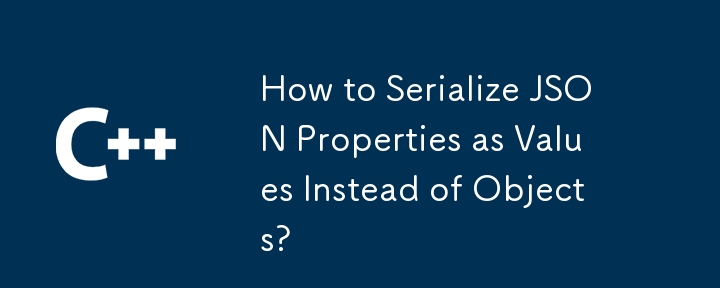Home >Backend Development >C++ >How to Serialize JSON Properties as Values Instead of Objects?
How to Serialize JSON Properties as Values Instead of Objects?
- DDDOriginal
- 2025-01-03 09:24:43947browse

Serializing JSON Properties as Values
When utilizing JSON representations in your code, you may encounter situations where you want to serialize a property as a value rather than an object. This is to achieve a more concise and desired JSON format.
Let's consider the following example involving the Car and StringId classes:
class Car
{
public StringId Id { get; set; }
public string Name { get; set; }
}
class StringId
{
public string Value { get; set; }
}
// Desired representation
{ "Id": "someId", "Name": "Ford" }
// Default (undesired) representation
{ "Id" : { "Value": "someId" }, "Name": "Ford" }
The desired JSON representation eliminates the nested object for Id and directly displays its Value. To achieve this, we can employ two approaches:
Using a TypeConverter
By implementing a TypeConverter for StringId, JSON.NET will automatically use it to convert the property to a string:
[TypeConverter(typeof(StringIdConverter))]
class StringId
{
public string Value { get; set; }
}
class StringIdConverter : TypeConverter
{
// Implementation omitted for brevity...
}
Using a JsonConverter
This approach requires you to add specific JSON.NET attributes to your StringId class:
[JsonConverter(typeof(StringIdConverter))]
class StringId
{
public string Value { get; set; }
}
class StringIdConverter : JsonConverter
{
// Implementation omitted for brevity...
}
In both cases, the converter reads and writes the value directly, resulting in the desired JSON representation:
{ "Id": "someId", "Name": "Ford" }The above is the detailed content of How to Serialize JSON Properties as Values Instead of Objects?. For more information, please follow other related articles on the PHP Chinese website!
Related articles
See more- C++ compilation error: A header file is referenced multiple times, how to solve it?
- C++ compilation error: wrong function parameters, how to fix it?
- C++ error: The constructor must be declared in the public area, how to deal with it?
- Process management and thread synchronization in C++
- How to deal with data splitting problems in C++ development

